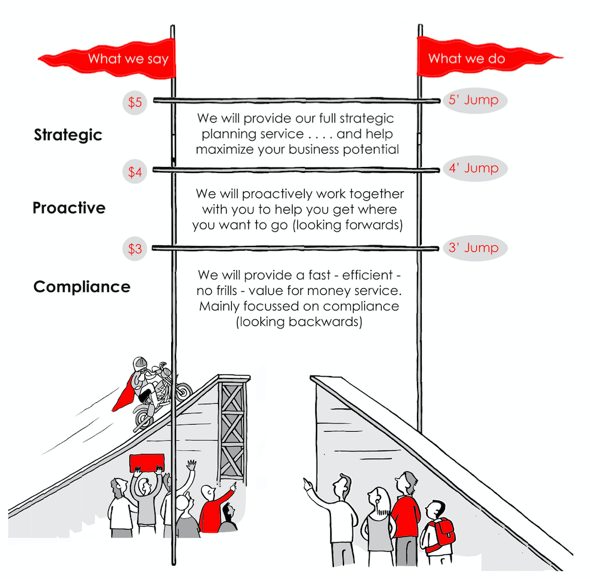6 Key Areas of Business Advice in 21st Century Part Two – Only 4 Ways to Grow a Business
We believe that 80% of straightforward, no nonsense, strategic advice can be summed up in just 6 Key Areas of Business Advice.
We believe that 80% of straightforward, no nonsense, strategic advice can be summed up in just 6 Key Areas of Business Advice.
In Part 1 of this 6 part series of blogs – we are asking the question – “What’s your strategic focus? Is it to add more value, to be more efficient, or do you actually need to separate?”
This involves some logical thinking: First you need to decide / establish:
Why do your customers primarily buy your product or service?
There are 5 potential answers – Customers primarily buy:
“Yes please – I just want that latest gizmo and I really don’t care how much it will cost”.
“Yes please – I am going to buy your tax planning service because the benefit is you will save me a million dollars – but I am not buying for any price – how much will it cost?”
“Yes please – I really want my house painting and your work looks great – but before I buy I am going to compare the price with some other decorators”
“Yes please – go ahead and prepare my tax return for last year – I like your service, but if you increase the price I will move to another CPA who can prepare the same return for a cheaper price”.
“Yes please I will have that bottle of water because it is the cheapest – and I can’t tell the difference between this water and the other bottles”.
You should allocate your own products or services into one of the above 5 areas. As a generality – Most businesses find that their products or services fit into categories 2-3-4 (and very few will fit into categories 1 or 5).
If your products or services mainly fit into Areas 1-2 – then the strategic focus is obvious. These are “star products” and you should focus on the benefit and improving your ability to add-value. In the example above it would be better for the tax planning provider to focus on offering even better tax saving solutions and ideas (to add value to their clients) rather than focusing on being more efficient (nobody cares whether they save a million dollars one day earlier – or one day later – they just want to save the million dollars!).
If your products or services mainly fit into Areas 4-5 – then the strategic focus is also obvious. These are “cash cows” and you should focus on the price and improving your efficiency and effectiveness. In the example above it would be better for the tax return provider to focus on making sure that the tax return is prepared 100% accurately and on time. It is impossible to add value to something that happened last year (tax planning impacts what happens next year).
But what about if your products or services fit into Area 3 – or perhaps you have some services that fit into Areas 2, 3 and 4. In that case your strategic focus is to “Separate.”
If you have products or services in Areas 2 and Area 4 separation is easy. You only need to make sure that you have different people accountable and responsible for providing either one service or the other – but never both (unless your business is too small to separate responsibilities). If you don’t do that then you usually end up with what we call “Monday – Friday Syndrome” :
The answer here is obvious – get people focused on whatever is the strategic imperative and what the person involved (personally) does best. If you do that they (and your business) will improve performance dramatically.
Where you have products or services in Area 3 the answer is usually to really try and separate the service.
Think of your service like jumping over a high jump bar
Let’s say the bar is set at 3’ and we are going to charge $3. This is what normally happens. The business is so focused on clearing the bar that they don’t stop at jumping 3’ – and in fact they end up jumping 4’ or perhaps even 5’ for the customer.
The business problem is not jumping too low – the problem is jumping too high. Typically businesses will jump 5’ for their customer but only charge the $3. They do too much for the money. This is because they have not properly separated the service (or worked hard enough at defining and separating the differences).
What you need to do is to really define the differences between 3’ and 4’ and 5’ offerings – and separate the differences properly and then offer the customer choices – as shown in the illustration below.

In this way – your Area 3 service can usually be better separated. You will move some elements more towards the efficient focus and some elements more towards add-value focus.
In our experience 99% of service based businesses will strategically benefit from better separation.
So – a key rule of strategy – think: Add - Value? - Efficient? - Separate?
© 2019 HaydenRock Solutions, LLC
We believe that 80% of straightforward, no nonsense, strategic advice can be summed up in just 6 Key Areas of Business Advice.
We believe that 80% of straightforward, no nonsense, strategic advice can be summed up in just 6 Key Areas of Business Advice.
We believe that 80% of straightforward, no nonsense, strategic advice can be summed up in just 6 Key Areas of Business Advice.